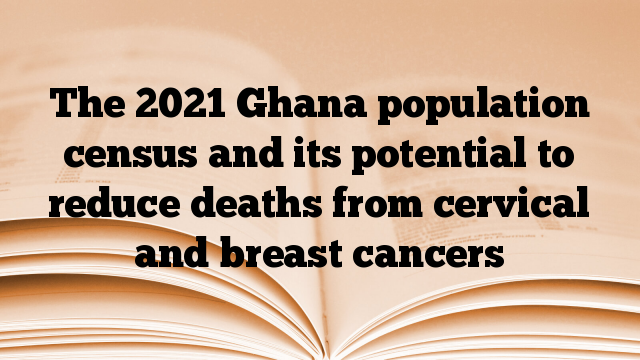
Tuesday, June 22, 2021.
Ghana is preparing to conduct the 2021 Population and Housing Census which aims to count everyone. June 27, 2021 is the census night, the reference point for enumeration. Enumeration of all persons is from June 28 to July 11, 2021. Everyone is encouraged to support this to make it successful because of the benefits of population censuses in planning and developing a country.
While we all try to support this to have a successful census, questions may come up. For example: Who owns the data from the census? Of course Ghanaians own the data but an institution or institutions may keep the data in trust for Ghanaains. How easy is it for individuals, groups of people or communities to have access to the information when they need it, especially in the interest of society?
In 2015, Catholic Hospital, Battor in partnership with an institution in Germany offered cervical precancer screening for some 2,000 women in the North Tongu District where Battor is situated. It was a novel project where the women used self-sampling, and took the samples themselves in their homes with a self-sampling device (brush). The women did not have to go to a health facility. The samples were picked up by community health workers, transported to the laboratory in Battor where 2 samples were generated for every brush submitted. One sample was run with a simple Human Papillomavirus (HPV) test in the laboratory in Battor, and the second sample transported to Germany for full HPV genotyping. This gave the prevalence of HPV in the North Tongu District, important information for policy and planning cervical cancer prevention in Ghana:
https://journals.plos.org/plosone/article?id=10.1371/journal.pone.0218762
Women who tested positive were followed by (with pap smears and colposcopy) and those who needed treatment got it without having to pay any money themselves. The project was sponsored by the GIZ and the German Rotary Volunteer Doctors (GRVD).
Why do I bring this project here? Before we screened 2,000 women in the communities in the North Tongu District, we wanted to be sure that we had a representative sample from all the communities in the district. We wanted the district register to get the number of women in the district from the 2010 census. The district did not have it! Eventually we got the information from the Ghana Statistical Service.
Why didn’t (or doesn’t) our district have the district register from the 2010 population census? I thought this would be something readily available in all districts to aid in planning. I was wrong. Other districts I asked of also didn’t have it. Is it because they have not asked for district registers? People I asked this question gave many reasons. The most interesting was a ‘conspiracy theory’ that suggested that some political parties in Ghana made a conscious effort not to get the register to the districts and communities because it would expose the bloated voters register. Some political parties wanted to keep the voters register bloated so that they could cheat during the presidential and parliamentary elections. Interesting, isn’t it?
As we continue to fight avoidable deaths from cervical cancer, breast cancer and other diseases and problems, we need information at the community level across the country to plan. We need community registers to invite women for screening and to follow up screen positives. I hope that after the 2021 Ghana Population Census is conducted, districts/communities will have access to registers that will help in cancer prevention/early detection programmes, and other programmes not only in health.
Ghanaians own the data from the population census. They must get the most out of this.
Dr Kofi Effah is a gynaecologist and head of the Cervical Cancer Prevention and Training Centre in Catholic Hospital, Battor in the North Tongu District of the Volta Region of Ghana.
